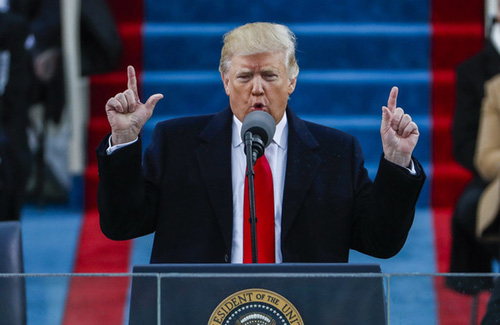
Following Donald Trump's inauguration speech on January 20, in which he announced that the United States would embark on "the era of Trump 2.0," the 47th president signed a series of orders and made a package of promises. These policies include raising tariffs on imported goods, reducing taxes on domestic companies, supporting the development and exploration of traditional energy sources, reducing support for green energy sources, and returning to traditional energy vehicle manufacturing. In the context of uncertain global economic prospects, this paper will conduct an in-depth analysis and discussion on the risks and challenges that the relevant policies of Trump 2.0 era will bring to the global economy.
First, there is the "signature" policy of raising tariffs on imported goods. The reason why Trump signed this executive order may be to stimulate the US economy, however, from an economic point of view, significantly increasing tariffs on imported goods is an artificial interference in the commodity market, which not only violates the market mechanism of free competition, but also may have a reverse impact on consumers and domestic enterprises. On the one hand, from the perspective of enterprises, many American enterprises source raw materials from abroad, and raising tariffs will increase the manufacturing costs of some enterprises, thus affecting business operations and bringing greater operating pressure to American enterprises. On the other hand, from the perspective of consumers, the increase of enterprise costs and the increase of tariffs on some finished products will bring challenges to the stability of prices to a certain extent, and then affect the consumption level of consumers, resulting in a negative impact on economic demand.
From a global point of view, on the one hand, raising tariffs on imported goods is essentially an act of trade protectionism, which may trigger other countries to take retaliatory measures to further escalate the trade war, resulting in greater challenges to the economic growth of all countries. On the other hand, the United States is an inevitable link in the global economy. The practice of increasing tariffs on imported goods is bound to affect the entire economic industry chain, which will trigger a series of chain reactions and cause inevitable "harm" to the world economy. In addition, from the perspective of US trading partners, the increase in tariffs may bring higher economic costs to trade partners, thus affecting the unity and cooperation of some major trading partners.
The second is a policy to reduce taxes on domestic companies. From the perspective of the United States, reducing corporate taxes may reduce the operating costs of domestic enterprises in the short term, but from a long-term perspective, the policy of "tax reduction" echoes the policy of "tariff increase". Trump's policy of reducing domestic corporate taxes and increasing tariffs on imported goods is actually unilaterally implementing "priority" protection. Thus, trade protection will be carried out and market injustice will be intensified, which will inevitably disrupt the original market division of labor order and affect the original strategic policies of other countries, thus bringing more serious risks to the global economy.
Second, the "2.0 era" supports the development of traditional energy sources. From a global perspective, some of the world's major traditional energy sources, such as oil and natural gas, mainly come from the Middle East, and the United States' increased development and exploration of traditional energy may make the already fragile economic situation in the Middle East become "worse". On the one hand, affected by the geopolitical war, the economic level of the Middle East has suffered a serious setback, on the other hand, from the perspective of resources, the economic structure of the Middle East mainly relies on resource exports, Trump's policy of increasing traditional resource exploration is bound to affect the energy income of Middle Eastern countries.
Then there is the "2.0 era" about the reduction of green energy support and the relevant initiatives of the traditional energy vehicle manufacturing industry. On the one hand, from the perspective of the United States, reducing the support for green energy may make the previous policy pay "ashes", resulting in a waste of existing human and material resources. On the other hand, from the global perspective, the current global economic prospects are uncertain and need to be promoted by technological update, giving up the research on green energy will make the global economic reform encounter greater resistance. Second, for other countries in the world, the United States' "abandonment" of new technologies may make countries' exploration policies for green industries wavering, thus making the current economic structural transformation and upgrading face more difficulties and risks.
In general, a series of relevant policies introduced by the "Trump 2.0 era" may bring greater risks and challenges to the global economy. Raising tariffs may lead to further escalation of trade protection and systemic impact on the global industrial chain, thus making the economies of all countries in the world face huge problems. It may make all countries in the world face the injustice of the economic market and disrupt the original world market economic division of labor. The support for the traditional energy industry and the weakening of the green energy policy may lead to the further regression of the economic level of the original main energy producing countries, and at the same time bring greater risks to the transformation and upgrading of economic structure.
In summary, the "Trump 2.0 era" will bring more risks and challenges to the global economy. In the context of the slowing down of the global economy, countries should continue to pay attention to relevant policies and strengthen economic communication and cooperation, so as to seek more long-term planning and development without affecting the economic interests of other countries.

報告顯示,中國電力投資加速增長,預計2024年電網基建投資將超過5300億元。
近日,市場迎來了一則引人注目的消息:工業巨頭3M公司(MMM.N)在本周五公布了其季度業績報告,隨後股價飆升至近兩年來的
最近,外媒給OpenAI算了筆賬,今年可能要血虧50億美元。
近日,巴黎奧運會和世界鐵人三項協會聯合發布了一項重大決定,宣布因塞納河水質污染問題,原定於近期進行的奧運會鐵人三項首次下
當地時間7月18日,法國巴黎發生了一起令人震驚的持刀襲警事件。
近期,一則重大消息在國際舞臺上引起軒然大波,馬來西亞宣布加入金磚國家。
調查發現,互聯網和智能手機的使用幹擾了韓國近五分之一學生的生活。